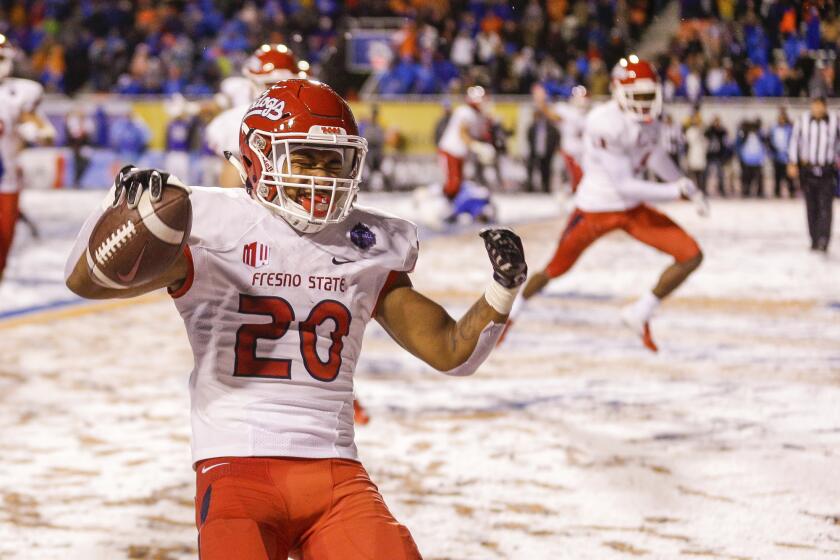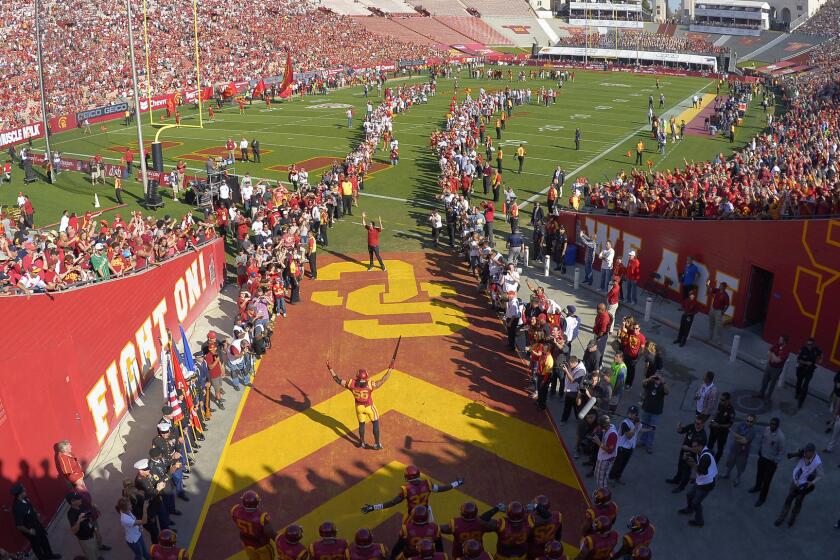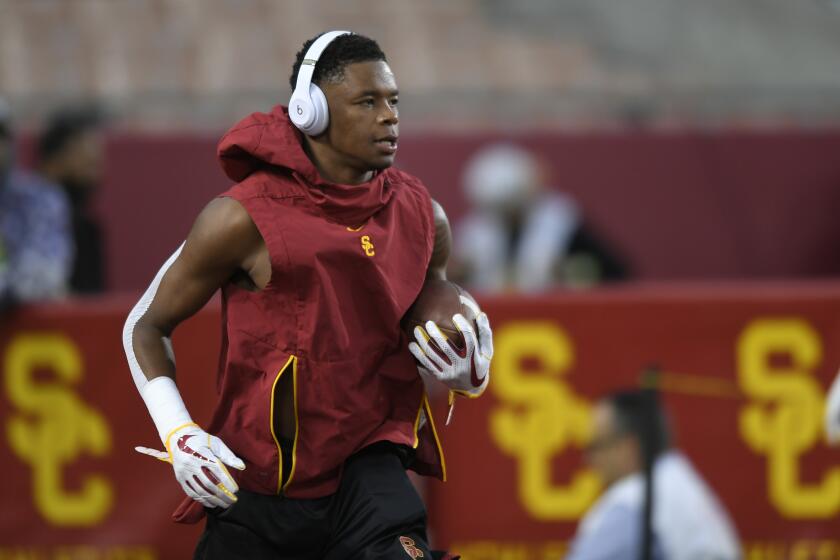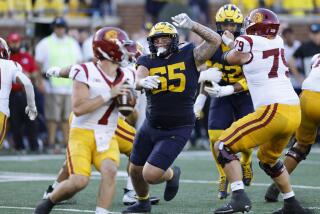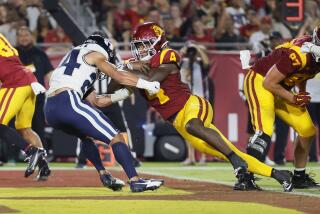USC quarterback JT Daniels is ready for a big season after a summer of change
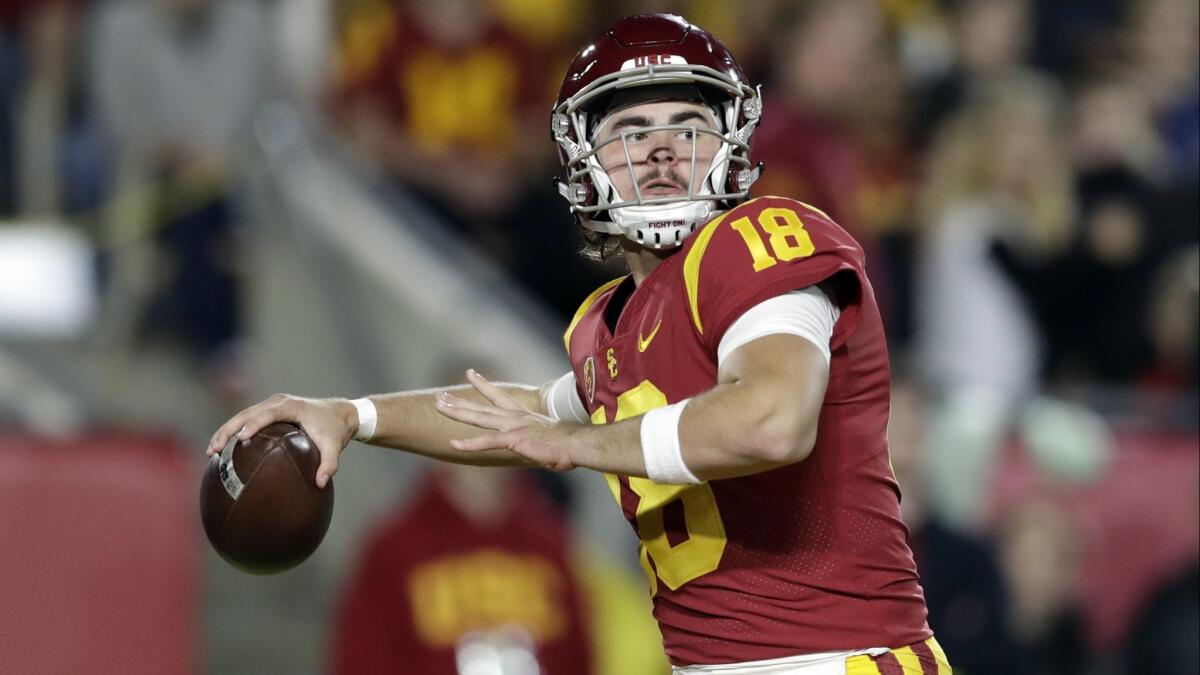
- Share via
When he’s analyzing a client’s blood, Chris Talley prefers to have no clue what he’s searching for. He approaches the process with a detective’s instinct, sifting through evidence until complex pieces of a grand, physiological puzzle begin to fit.
Each of the nearly 200 biomarkers for which Talley tests at his South Bay offices inform part of a larger story. And for the nearly two decades Talley has spent studying the blood of elite athletes, his primary job has been to connect those dots.
“It’s a little bit like nutritional forensics,” Talley explained. “What’s missing? You’re looking for all of those details that could solve the case. What’s keeping this person from being optimal?”
It was that question, in the wake of his freshman season, which led JT Daniels to search his own blood for answers. After reclassifying to forgo his final year at Santa Ana Mater Dei High, the former top recruit and National Gatorade player of the year became just the second true freshman to open a season as USC’s starting quarterback.
But Daniels never found his footing, and the Trojans stumbled, finishing 5-7 and missing a bowl game for the first time in a non-sanctioned season since 2000.
The ebbs and flows of Daniels’ debut were like other young virtuosos before him — Matt Barkley, who would go on to set most of USC’s career passing records, had 14 passes intercepted to Daniels’ 10 as a first-year starter.
USC Fresno State matchups
But so few freshmen arrived with the full-blown mythos that Daniels carried with him from Mater Dei, where he lost only four games in three seasons.
Steve Daniels would go to great lengths to put his son in such charmed standing, surrounding him with anything or anyone he might need to succeed. But last season, as failure struck anyway, he too found himself wondering how his son might react.
His freshman year “was the first time in his life where JT worked his butt off and didn’t have massive success,” Steve said. But those closest to him, from his father to his fleet of private coaches and mentors, have since begun to wonder if a brief brush with failure might be the best thing for Daniels.
“Matt Leinart didn’t face adversity like that until he got to the NFL,” said Jordan Palmer, one of Daniels’ private quarterback coaches. “I think that had a lot to do with how his career went.”
Daniels isn’t one to pontificate on the bigger picture or his place in it. But in any conversation about USC football or its quarterback, the stakes ahead of his sophomore season are altogether inescapable.
How Daniels responds in the wake of failure could very well determine the fate of not only hisseason, but the future of his coach and the direction of USC’s program altogether.
With that specter looming over the months leading up to the season opener Saturday against Fresno State, Daniels focused his attention on something smaller. He reconsidered his approach from all angles. He needed to understand exactly where and why things had gone awry.
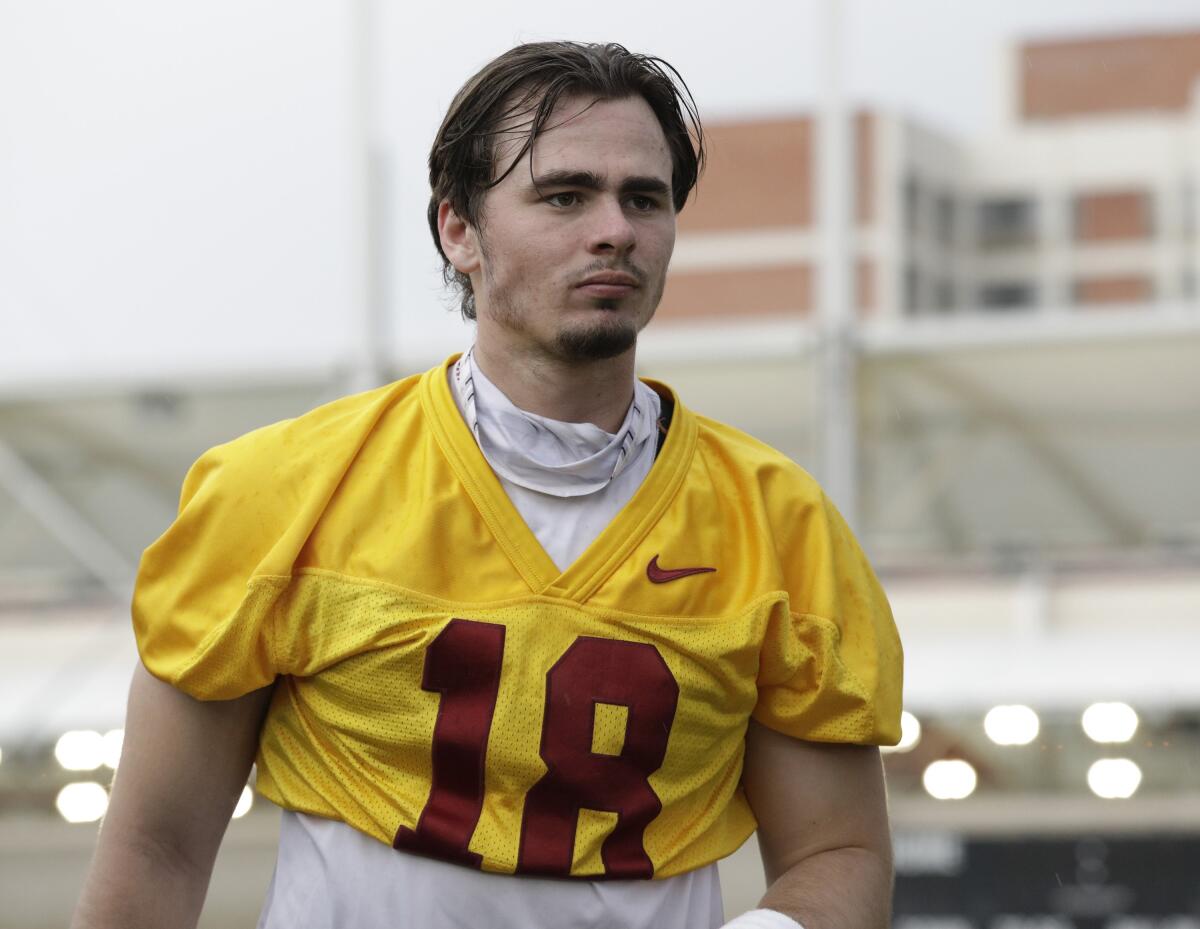
What he came to realize was that as an 18-year-old piloting one of the nation’s most prestigious programs, he didn’t really know what to expect. “I just kind of came in and was thrown into the fire a little bit,” Daniels explains.
He didn’t understand how his body would break down over a season or how his mental toughness might be tested.
What still wasn’t clear was why he felt so constantly drained. Falling asleep had long been an issue; most nights, he lay awake thinking for hours before finally drifting off. As long as he could remember, he simply gutted through it, subsisting on naps when he could.
Finding an answer felt urgent. So Daniels connected with Talley, whose company, Precision Food Works, has consulted with teams involved in each of the last six Super Bowls.
It wasn’t often teenage quarterbacks sought his services, which cost nearly $1,500 for a test and consultation. Most of his clients, Talley says, are professional athletes “looking to get 1% more.” But Daniels’ ambition impressed him.
The test results only furthered that intrigue. Biomarkers in Daniels’ blood painted a picture of a high-level athlete whose physiology was hardly doing him any favors. According to Talley, Daniels was “at best average and a lot of times lower than that” in most of the micronutrients usually found in top athletes performing at their physical peak.
Talley said the tests found Daniels was extremely low in lycene, an amino acid that aids in recovery, and beta-carotene, an anti-oxidant. He was in the bottom 20% of the population for coenzyme q-10, a crucial catalyst for energy production.
Most surprising of all was the severe reaction his body was apparently having to dairy. Milk had been a constant in his diet for years, even while his body produced an abnormal amount of antibodies to combat it.
National college football writer J. Brady McCollough predicts who’s going to win selected games this week. He says go with the Trojans, but pass on the Bruins.
“My body seriously fights a flu every time I drink milk,” Daniels explained, which was hardly ideal for someone downing it by the quart.
There was no magical cure-all hidden between the biomarkers. But the blood test had colored something he’d never before considered: For years, his body hadn’t been operating at its full potential.
In fact, he’d succeeded in spite of it. So what did that mean now? As Talley offered detailed diet advice — eat more grass-fed beef, try more bell peppers, cut out the Muscle Milk after workouts — the implications of that realization dawned on him.
With a new plan in place, his sleep improved. His energy crept back. The lesson stuck.
The months that followed wouldn’t be so much about sweeping changes, but the “1% more” that Talley mentioned. That’s what separated freshman failure from sophomore success.
So, as spring faded into summer, Daniels wondered: Where else could he unlock that extra 1%?
::
“Coach, I need a trash can.”
It’s early on a Friday morning in the weight room this past summer, and Daniels is quite sure he’s going to vomit. But there’s nowhere to go. Once in the phone booth, players are not allowed to leave. Not for a break. Not for the bathroom. Not for, well ... anything.
“If you get in a phone booth fight, there’s nowhere to go,” explained Aaron Ausmus, USC’s new strength and conditioning coach. “You stand toe-to-toe with a guy in a four-by-four square. You can’t get out of Dodge.”
So you make do. Surviving the phone booth means planning accordingly. Water bottles at the ready, trash cans nearby. With four players to a station, tight quarters make efficiency a must. Sets are timed, with 20 rounds of five basic exercises and only a minute or two to catch your breath in between. After each round — of squats, of bench, of chin-ups, of whatever the day demands — a bell rings.
“If you do not talk to each other, if you don’t work well together, you can’t complete the work within the round,” Ausmus said. “It’s impossible. If you have one flat tire, you’ll get exposed.”
Ausmus brought the phone booth with him to USC, where he returned this season after five years away from football.
The idea was to force players to communicate at their most urgent. He partnered players he knew weren’t familiar. He told them to speak up, to look each other in the eye. The phone booth, Ausmus hoped, would test his players’ minds as much as their bodies.
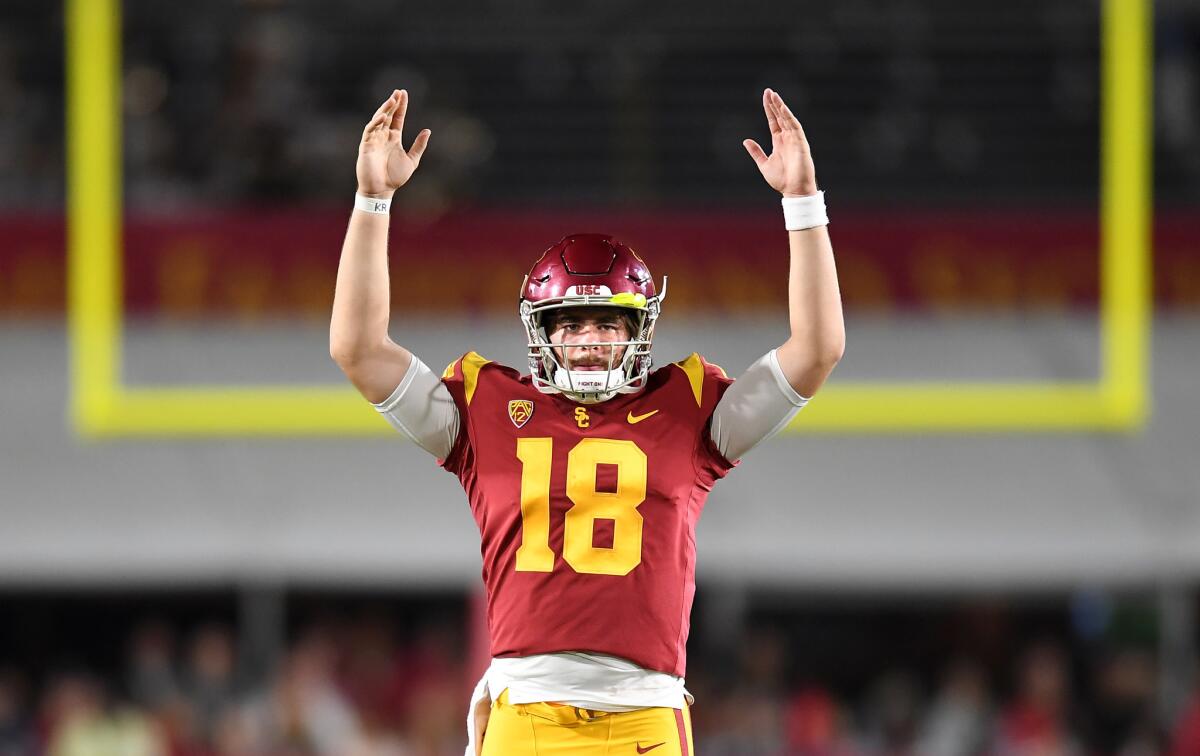
Over the course of his freshman season, Daniels’ body was pushed further than he expected. He was sacked 24 times in 11 games, and with each hit, nagging aches and pains piled up. As the season wore on, the wear and tear worsened.
“Last year, I wasn’t a huge lifter,” Daniels said. “I was much more focused on being completely mentally prepared and ready. But now I know the season takes a toll on you.”
That’s where Ausmus came in. He wanted Daniels to embrace the uncomfortable. He pressed him to be a leader, even as his body was pushed to its physical brink.
It was in those circumstances, a year ago, that the Trojans seemed to struggle most. Daniels tended to fade late — his completion percentage dipped by 6% after the half. Usually, USC followed suit, losing four of its final five games by 18 combined points.
But there was no fading in the phone booth, not with the entire team watching, not with so much on the line, and after a few Fridays of painstaking training passed, Daniels started feeling the results. He was stronger and sturdier. He could sling the ball farther too.
Looking back, months later, Daniels would call those Friday mornings in the phone booth the most memorable part of his summer.
“He really bought in,” Ausmus said, “and his body has changed pretty drastically.”
::
Daniels’ mind had never been in question. Before he stepped foot onto USC’s campus, stories of Daniels’ drive and football intellect were already canon in Southern California, where, since middle school, a small army of coaches and mentors had counseled him on exactly how to think and act like a quarterback.
Trevor Moawad joined that circle a few years ago, long after the myth-making first began. But over the past few months, as the cerebral sophomore searched for answers, there are few people, if any, whom Daniels has leaned on more.
Still, his role in Daniels’ life isn’t easily defined. “He’s not a sports psychologist,” the quarterback says. “He’s not a life coach. But he’s somewhere in between that.”
Moawad considers himself many things, but he’ll settle for “mental conditioning consultant.” In that capacity, he has worked most famously with Seattle Seahawks quarterback Russell Wilson, who swears by Moawad and even calls him a “best friend”.
He has no consumer-based brand, but Moawad’s client list comprises many at the forefront of their respective professions, ranging anywhere from Alabama football coach Nick Saban to Navy SEALs special ops, all of whom come to him in search of ways to sharpen the mind.
Daniels was 14 when he met Moawad at a quarterback summit arranged by Palmer. He was the youngest in a room that included future Pro Bowl players Patrick Mahomes and Deshaun Watson, but Palmer already trusted him to fit in.
In truth, Daniels was already well ahead of his peers in terms of thinking like a top quarterback. By 10, Daniels was making pre-snap checks in Pop Warner. At 12, his flare for film study was already known to coaches at Mater Dei. By 13, he was requesting book recommendations on leadership from Palmer — then, calling back two weeks later to discuss them.
USC released its first depth chart ahead of Saturday’s season opener against Fresno State and it includes some surprises and a demotion.
As Moawad spoke to the gathered young quarterbacks, something clicked for the youngest in the room. His methods felt practical. With Moawad, there was no emphasis on mindfulness or meditation or being relentlessly positive, all things that didn’t jibe with his analytical nature.
“The idea of being neutral was extremely powerful to JT,” Moawad says. “It allowed him to understand that, OK, this happened, but what happened next is based on what I choose to do, not what just happened.”
So Daniels spent most of the night picking Moawad’s brain. Over the years, he would maintain the relationship from Mater Dei to USC, reaching out whenever he needed advice.
Daniels wasn’t strictly a client; he has never paid Moawad for that advice. But Moawad has dedicated hours of his time to Daniels’ mind, answering questions whenever he might need.
Recently, their contact became more consistent. The timing was no coincidence. In light of last season, Daniels resolved to be more mentally tough, and he wanted to prepare for how.
Via text or call, they ruminated on deeper questions surrounding his role: “What do the best quarterbacks do? How do the best quarterbacks manage a new offense? How do the best quarterbacks impact other people?”
They worked on practical strategies for separating feelings from behaviors. “Feelings betray everybody,” Moawad explained. So he turned Daniels’ focus instead to his behavior, which would always be in his control. He showed clips of Wilson and told him to study how he spoke. “That’s behavior-based language,” he said.
Moawad offered up an infamous example: Wilson’s Super Bowl-losing interception at the one-yard-line. At the time, it was perhaps the most scrutinized gaffe in the game’s history. Dwelling on that disappointment might have completely derailed another quarterback.
“But did all of that change the simple fact that it was only one play?” Moawad asked. “Ultimately, what happened next was going to be based upon how he approached the offseason.”
What happened next, as Moawad would point out, is that Wilson had the best season of his career.
::
Daniels was thinking too much. Graham Harrell could practically see the wheels turning in his quarterback’s head.
Harrell had only just arrived at USC, and his Air Raid offense had yet to be installed. But the excitement over the new system was palpable, and as its purveyor further explained its most basic philosophies to a room of quarterbacks, Daniels was already knee-deep in hypotheticals, quietly planning out every detail of how he might respond in any given scenario.
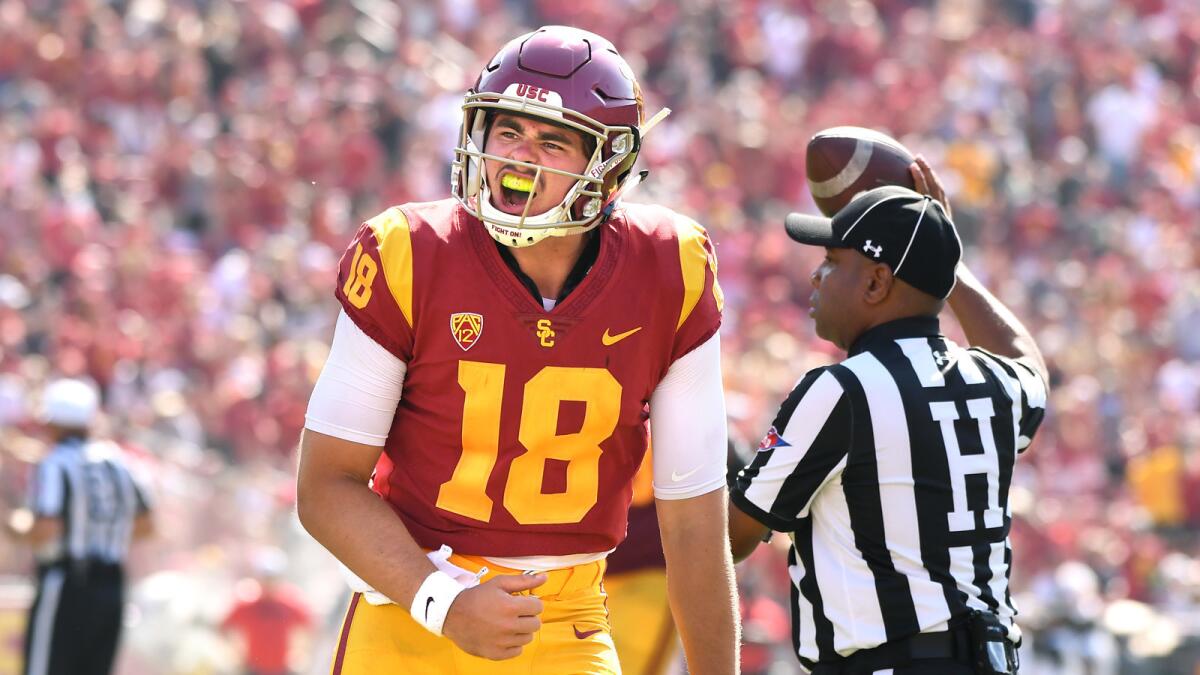
As Daniels’ mind raced, even Harrell couldn’t keep up.
“He started asking about this coverage that I’m pretty sure he made up,” USC’s offensive coordinator recalls, with a laugh. “I told him, ‘I don’t even know what you’re talking about. Just throw it to the open guy.’ ”
The directive didn’t register. “But,” Daniels started, “if they’re running this against that play ... ”
“JT, I don’t even what that coverage is,” Harrell said. “Throw it to the open guy.”
That brazen simplicity was the beating heart of the Air Raid offense, but simplicity was not a notion with which Daniels was all that familiar, much less comfortable.
At Mater Dei, where coach Bruce Rollinson tracked his players’ film study, Daniels often spent 20 hours or more every week watching tape. Teammates marveled at his study work. Coaches trusted him to call plays.
“It was all on the quarterback,” Steve Daniels said. “That was his background.”
Daniels always took that responsibility in stride. But in Harrell’s system, there was no such expectation. The Air Raid was meant instead to unshackle quarterbacks from extraneous responsibility. Stripped of complexity, the up-tempo offense was intended to hum along as fast as possible.
Except, at first, Daniels couldn’t help but slow everything down. “He’s so analytical that he wanted to see everything and think about it,” Harrell says. “We had to break him from overthinking.”
There was no such issue a season ago when the Trojans ran a strict pro-style offense, complete with a hefty playbook Daniels now half-jokingly refers to as an “encyclopedia.”
At times, Daniels found himself bogged down by his own acumen. USC’s coaching staff agreed to let him try a few drop-back methods he’d researched on his own, a significant show of confidence in the quarterback. But looking back, his father wonders if that freedom might’ve been a bit myopic for a true freshman.
“That’s awesome at the NFL level,” Steve says. “He would suggest something, and they would say, OK. He had the freedom to do what he wanted. But then, he’s dropping, and he doesn’t do it exactly right. He’s got three ways to drop now, and he does it a fraction of a second late and misses the play.”
He shakes his head.
“This year, he’s going to drop Harrell’s way every time,” Steve says. “It’s as simple as that. As a 19-year-old kid, he needs that.”
That much was clear in those first few days of install, as Harrell and quality control assistant John David Baker laid out USC’s new offense. Last January, in an office at North Texas, the two of them had watched tape together of last season’s offense, hoping to understand what awaited in L.A.
It was USC’s fleet of talented receivers who first caught their eye. Neither of them knew much about the 18-year-old throwing them the ball. But even on film, it seemed obvious to Baker that Daniels was overloaded. Together, they wondered if the Air Raid might help lift that burden. Soon, they would understand just how much.
“You could see plays where it’s seven or eight words long, and he’s telling everyone what to do and how to motion,” Baker said. “But it’s like, forget that. Now, it’s one word, two words. Now he can just focus on doing the same things over and over again, better and better.
“We really feel like this offense can fix a lot.”
::
As for the rest? USC can only wait and hope.
To Daniels, every step he has taken since last season has readied him in some way for Saturday, when his sophomore season will begin, bringing with it equal parts optimism and uncertainty.
But this time, Daniels knows what to expect. He knows not to overthink the Air Raid. He understands how to better prepare, mentally and physically. And he knows not to overdo it on dairy.
“That’s just experience,” Daniels said. “You can’t create that. It just happens the more you play, the more you go through things.”
More to Read
Go beyond the scoreboard
Get the latest on L.A.'s teams in the daily Sports Report newsletter.
You may occasionally receive promotional content from the Los Angeles Times.

